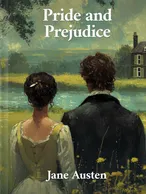What is the moral lesson of Pride and Prejudice?

Pride and Prejudice is a timeless love story that has captured the hearts of people for centuries. But what is the moral lesson of this story? Is it simply that true love conquers all? Or is there something more to be learned from the characters in this novel? In this article, we will explore the moral lesson of Pride and Prejudice and discuss what it means for us today.
- What are the moral lessons of Pride and Prejudice?
- The importance of love and family
- The danger of pride
- Respecting others
- Forgiveness
- Learning from our mistakes
- The meaning of happiness
1. What are the moral lessons of Pride and Prejudice?
The overall moral lessons of “Pride and Prejudice” are that love and family are important, and that pride and prejudice can be dangerous. These themes are much deeper than they may appear at first glance. The characters in this novel teach us about the importance of respect, forgiveness, and learning from our mistakes. “Pride and Prejudice” is so much more than just a love story; it is a story about growing up and learning the value of those things that are most important in life.
While the novel does have a happy ending, Austen makes it clear that this is not always the case in real life. The characters must work hard to overcome their pride, and they are not always successful. This is an important lesson for us all to remember. We must be careful not to let our pride and prejudice get in the way of our relationships with others. If we can learn this lesson, then “Pride and Prejudice” will truly have been a valuable read.
You don’t have to burn books to destroy a culture. Just get people to stop reading them Ray Bradbury
2. The importance of love and family in «Pride and Prejudice»
The importance of love and family in “Pride and Prejudice” is evident throughout the novel. For example, when Mr. Bennet learns that Lydia has eloped with Mr. Wickham, he is so distraught that he says,
“What Wickham wants is not money, but a wife. He wishes to get rid of Lydia because she is an embarrassment to him. If he had not seduced her, she would have been married off to some other man and this would all be over” (Austen 95).
In this passage, Mr. Bennet shows that he values his family more than anything else and is willing to do whatever it takes to protect them. This theme is also evident in Mr. Darcy’s proposal to Elizabeth. After telling her about his feelings for her, he says,
“I am not asking you to change your feelings for me. I only ask that you will not change your opinion of me” (Austen 368).
This shows that Mr. Darcy understands the importance of Elizabeth’s love and respect and does not want her to change her opinion of him based on his wealth or status. Ultimately, the importance of love and family in “Pride and Prejudice” is demonstrated by the characters’ willingness to do anything for their loved ones.
3. The danger of pride «Pride and Prejudice»
In “Pride and Prejudice,” the danger of pride is shown through the characters of Mr. Bennet and Lady Catherine. Mr. Bennet is proud of his intelligence and wit, and this leads him to be dismissive of others and neglect his family. Lady Catherine is proud of her rank and status, and this leads her to think that she can do whatever she wants. Both characters are ultimately undone by their pride.
Another example is when Mr. Darcy first meets Elizabeth Bennet, he is immediately prejudiced against her because she is not from a wealthy or high-class family. He looks down on her and doesn’t think she is good enough for him. But as he gets to know her, he realizes that she is an intelligent and kind person, and his prejudice against her gradually disappears.
The moral lesson of “Pride and Prejudice” is that pride can lead to blindness, and it is important to look beyond appearances. Elizabeth Bennet can see beyond Mr. Darcy’s pride, and in the end, he falls in love with her because she has seen the good in him that he could not see in himself.
For example, Mr. Bennet says,
“For what do we live, but to make sport for our neighbors, and laugh at them in our turn?” (Austen 9).
This quote highlights how people can often be too proud to see the humor in life. Another example can be seen when Mr. Darcy says,
“She is tolerable; but not handsome enough to tempt me” (Austen 86).
This quote shows how Mr. Darcy is blinded by his own pride and does not see the beauty that lies before him. Finally, Lady Catherine says,
“You ought to be ashamed of yourself, for wanting to marry a woman with five thousand pounds” (Austen 207).
This quote highlights how Lady Catherine is blinded by her own pride and believes that only wealthy women are worth marrying.
4. Respecting others
In Pride and Prejudice, one of the main themes is the importance of respecting others. «This is shown through Mr. Bennet's treatment of his daughters and Mrs. Bennet's treatment of her husband.» Mr. Bennet respects his daughters enough to allow them to make their own choices in life, even if he doesn't always agree with them. Mrs. Bennet, on the other hand, does not respect her husband, often putting him down and trying to control him. By respecting others, Mr. Bennet and Mrs. Bennet can have a more harmonious home life.
For example, Mr. Bennet's respect for his daughters is shown when he allows them to choose their husbands, even though he doesn't always agree with their choices. In Pride and Prejudice, Elizabeth Bennet chooses to marry Mr. Darcy, even though her father does not approve of him at first. Mr. Bennet respects Elizabeth's decision and eventually comes to accept Mr. Darcy as a son-in-law. This shows that Mr. Bennet respects his daughter's choices, even when he does not agree with them.
Mrs. Bennet, on the other hand, does not respect her husband's wishes or choices. For example, Mrs. Bennet is always trying to control Mr. Bennet and make him do what she wants. She is also always putting him down, which shows a lack of respect. If Mrs. Bennet respected her husband more, she would likely be happier and have a more harmonious home life.
5. Forgiveness
Pride and Prejudice is a story about love and relationships. The moral lesson of forgiveness is shown throughout the book through the characters' actions. For example, when Mr. Bennet learns that Lydia has run off with Mr. Wickham, he is angry and upset. However, he eventually forgives her and welcomes her back into the family. Mrs. Bennet is also forgiving to her daughter, even though Lydia has caused her a great deal of pain. Mrs. Bennet recognizes that Lydia is still her daughter and she loves her despite her mistakes.
“Mrs. Bennet was excessively pleased to have such a respectable young man as Mr. Bingley interested in Jane... She was sorry to have him go so soon, but was contented with the assurance that he would come again soon.” (Chapter 2)
“She had the pleasure of being extremely acquainted with his sisters, Miss Bingley and Mrs. Hurst, of whom she often spoke... Miss Bingley was very handsome... Mrs. Hurst was agreeable enough.” (Chapter 3)
“Mr. Bennet saw perfectly that his wife would be glad to have Miss Lucas settled in the country as a married woman... He, therefore, took pains to introduce them.” (Chapter 16)
6. Learning from our mistakes
In “Pride and Prejudice,” one of the main moral lessons is that we should learn from our mistakes. As Mr. Bennet says,
“We all make mistakes, my dear...and the only way to learn from them is to admit them.” (Ch. 38)
This is an important lesson because if we don't learn from our mistakes, we are likely to make them again. For example, in “Pride and Prejudice,” Mr. Bennet makes the mistake of judging Elizabeth too hastily, and he ends up being wrong about her. By admitting his mistake and giving her a chance, he eventually comes to see that she is a good person. Similarly, Lady Catherine makes the mistake of thinking she knows what is best for Elizabeth, but she eventually learns that she doesn't know everything.
Ultimately, the lesson we learn from “Pride and Prejudice” is that it's important to be open-minded and to listen to others‘ opinions before making judgments. We should also be willing to admit when we're wrong to be able to learn from our mistakes.
7. The meaning of happiness
Happiness is a central theme in “Pride and Prejudice” In the book, Mr. Bennet says that “the only way to be happy is to be content.” (Ch. 38)
If we're not content with what we have, we will never be happy. For example, Mrs. Bennet is never content and she is always trying to get more money or possessions. This makes her unhappy because she is always chasing after something that she can never have. Mr. Darcy is another character who is not content. He is always trying to prove that he is better than everyone else, and this makes him unhappy.
Elizabeth Bennet, on the other hand, is content with what she has. Even though she comes from a wealthy family, she doesn't care about money or possessions. She is happy just being herself. This makes her a happier person than Mr. Darcy or Mrs. Bennet.
We learn from “Pride and Prejudice” that it is important to be content with what we have and to appreciate the simple things in life.
Conclusion
It is clear from “Pride and Prejudice” that there are many deep moral issues explored, such as the importance of family, love, money, status, and more. While Austen touches on these issues lightly in the novel, they can be explored much further with WholeReader.
The immersive reading experience of WholeReader helps to increase enjoyment through amplified reading comprehension. The higher reading comprehension of immersive reading allows the reader to unpeel layers of meaning from great classics.
